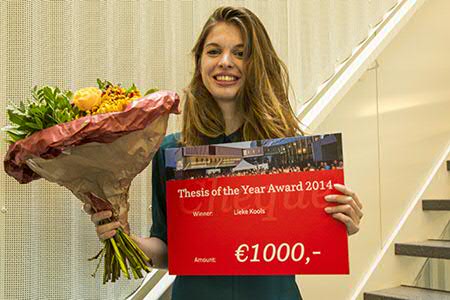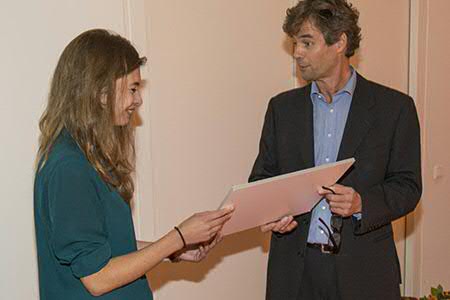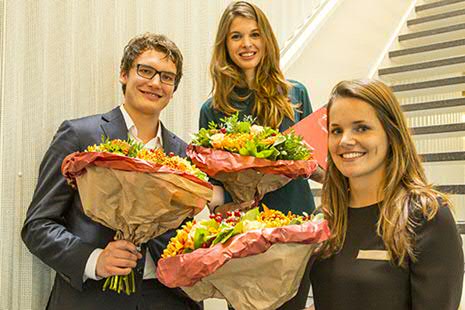Lieke Kools (MSc EORAS) wins MSc thesis award FEB

Last week, the winner of the FEB MSc thesis Award 2013-2014 was announced: MSc Econometrics, Operations Research and Actuarial Studies graduate Lieke Kools was chosen winner by the jury. She received a cheque worth € 1,000,-. In her thesis Lieke analyses the problem of uncertainty and variations in power demand.
Jury report
Nowadays more and more consumers start to generate electricity. In her thesis, Lieke analyses how this distributed generation of electricity goes together with the challenging problem of uncertainty and variations in power demand and supply. During sunny hours consumers may produce a surplus of electricity, but that surplus could quickly become a shortage when the weather changes and the sky becomes cloudy. To address that problem, Lieke has developed a stochastic optimization model to optimize power generation and distribution under uncertainty. The depth of her analysis and her critical thinking allowed her to reach very interesting results regarding optimal planning of distributed generation.
► Find out more about the thesis below*

Jury members were Prof. Onne Janssen, professor in Organizational Behaviour in Business and Economics, Prof. Tom Wansbeek, professor in Statistics and Econometrics and Prof. Jeroen Smit, professor in Journalism.
Interview with Lieke
What was your first reaction after winning the award and what does this award mean to you?
At first I was just really surprised and still nervous from the whole event. The other two nominees gave great presentations and the subjects were so different, that it was hard to guess who would win. Once it sank in I was just super excited and proud. The good mark on the thesis was already a great reward, but to get this extra confirmation from people who have not been part of the whole process is really special.
What do you do for a living now?
In April I started working as a PhD candidate at the economics department of the university of Leiden. In contrast to Groningen, the economics department in Leiden is connected to the law faculty, which provides a really interesting change of perspective. Currently I’m working on a project about consumption needs of elderly and how these are impacted by age and health.
Can you use your research in your current work or in your future career?
The topics and methods I deal with right now are completely different from those I used for my thesis. However, the skills I acquired in the process certainly come in handy for my current work. The knowledge I gained about distributed energy I mostly use outside work, as I am still very much interested in how we can accelerate the transition towards a fair and sustainable society.
What will you do with the € 1000 you have won?
I will spend the money on a digital piano. Now I can finally pick up playing again without making the neighbours angry.

Award ceremony
Lieke wrote her Master's thesis "The eect of modeling choices on decision making regarding the optimal planning of distributed generation" under supervision by Dr. D. Catanzaro, Dr. F. Phillipson RTD (TNO) and M.H. Schreuder (TNO). During the MSc thesis award ceremony, part of the Careers Week at FEB, three nominees presented their thesis for the jury and the audience. Besides Lieke Kools, there were nominations for Mariska Verstappen and Mark Damink. Only students with a grade of 9 or 10 were eligible for the award, the three best were nominated.
The thesis in a nutshell
The thesis revolved around planning problems in distributed energy generation. Much research has been directed towards finding appropriate mathematical models for optimal planning. However, less attention has been paid to the type of data that should be used as input for these model. Lieke tried to fill in this gap and looked at the effect of time aggregation and incorporating uncertainty in the data on the outcomes of the model.
| Last modified: | 01 February 2023 10.02 a.m. |
More news
-
19 April 2024
New thesis prize for master's students of Economics and Business
How can we encourage economics and business students to deal with important societal challenges in their master's thesis? The 14 Dutch faculties of economics and business, united in the Council of Deans in Economics and Business (DEB), have set up...
-
18 April 2024
Ward Romeijnders appointed as Professor of Optimization under Uncertainty
The Faculty of Economics and Business is pleased to announce that Ward Romeijnders has been appointed as Professor of Optimization under Uncertainty. The chair is situated within the Department of Operations.
-
12 April 2024
Inaugural Lecture Corine Noordhoff: Future ready retail
In her inaugural lecture, Professor of Retail Marketing Corine Noordhoff will provide insights in the cornerstones for survival and adaptation in the retail sector. Noordhoff’s inaugural lecture will take place on Friday 19 April 2024, 16:15 –...
